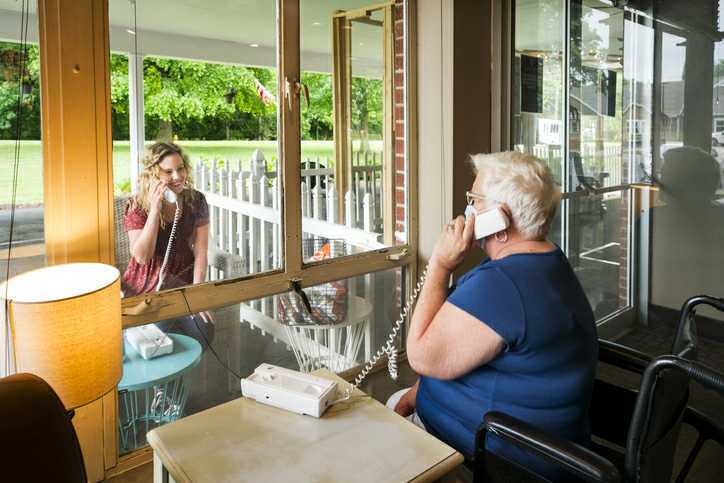Nursing home neglect lawyers explain why families want to visit
Due to the COVID-19 pandemic, many states prohibited nursing homes from allowing visitors, to prevent the spread of the coronavirus.
Now, many families want state officials to remove restrictions and allow families to visit loved ones in nursing homes, according to AL.com News. Little has changed since this news report first appeared in August. As of late September, Alabama was one of seven states nationwide that still prohibited visitors at nursing homes, except in end-of-life situations, according to AARP.
Nursing home visits can be beneficial for residents’ emotional well-being, but these visits also serve another important purpose. Family members who visit loved ones living in nursing homes can verify that they are receiving the care and support they deserve instead of being neglected or abused by nursing home employees or fellow residents.
Can Nursing Homes Legally Prohibit Visitors?
The decision to prohibit families from visiting nursing homes earlier this year was made at the national level. The Centers for Medicare and Medicaid Services (CMS) announced in March that no visits were allowed at nursing homes effectively immediately, unless visits involved end-of-life situations, according to an announcement released by CMS.
Since then, individual states have been granted the right to decide if or when families can visit loved ones in nursing homes. Alabama’s Department of Public Health has decided to keep its ban on family visits in place in the best interests of nursing home residents and public health. Georgia’s governor announced in mid September that nursing homes could accept visitors but only for outdoor visits and only if the nursing home receives approval from the state, according to AARP.
The impact of the ban on nursing home visits that started more than six months ago has taken a toll on residents’ mental health.
“It is changing them mentally and it is changing them physically,” Wendy Keeler of Madison, AL, who works as a speech therapist at a nursing home in Alabama, said in an interview with AL.com News. “The virus is real and we want to keep them safe. But we’re killing them too because of the isolation.”
How Common Is Nursing Home Abuse Or Neglect?
Nursing home abuse and neglect sadly occurs more often than many people might realize. Each year, an estimated 5 million people experience elder abuse. When it comes to nursing homes, an estimated 1 in 6 adults experience some type of abuse or neglect in nursing homes or assisted living facilities, according to the World Health Organization (WHO). In addition, 2 out of 3 nursing home staff members interviewed by the WHO for its report on elder abuse admitted to abusing a nursing home resident within the past year.
What Are Warning Signs Of Abuse Or Neglect?
Warning signs of elder abuse or neglect in nursing homes can cover a wide range. Take immediate action if you notice any of the following signs of abuse or neglect:
- Visible bruises or other unexplained injuries
- Sudden mood changes
- Unexplained weight loss
- Poor hygiene (unwashed face or hands, soiled clothes, etc.)
- Unsanitary conditions in the nursing home
Trust your instincts. If something doesn’t seem right or looks out of the ordinary, it’s important to take immediate action to protect your loved one’s health and well-being.
What Should I Do If I Suspect Abuse Or Neglect?
If you suspect your loved one is being abused or neglected in a nursing home, you need to act fast. Depending on the specific circumstances of your situation, you may need to take a different approach, but the suggested steps below can be a good place to start:
- If you cannot visit the nursing home, ask why. If officials refuse to provide an answer, ask to speak with someone else at the nursing home.
- You suspect that abuse or neglect is occurring, but can’t visit the nursing home. Ask the nursing home to provide information about your loved one’s medical condition. Ask when your family member last had a medical exam and for information from that exam. If they cannot provide this information, ask the facility to explain why.
- Talk to your loved one, in person, on the phone or via video chat. Take note of how they act during your conversation. Do they seem sad, depressed, scared or confused? Ask your family member about activities they have been doing there, what they had to eat that week. Details matter – and can be very telling.
- If the nursing home refuses to let you visit or talk to your loved one, ask them why. Get an explanation. You deserve one, especially if your mother, father or another family member is being abused or neglected.
- File a formal complaint with the appropriate state agency. In Alabama, nursing home abuse or neglect allegations are investigated by one of the following organizations:
- Alabama Department of Senior Services (ADSS)
- Alabama Long-Term Care Ombudsman program
- Alabama Department of Public Health (ADPH)
- In Georgia, allegations of nursing home neglect or abuse are investigated by the Georgia Department of Community Health (DCH).
Your Family Has Rights. Talk To An Attorney.
Depending on the circumstances of your nursing home abuse or neglect case, your family may be able to take legal action against the nursing home, including filing a lawsuit in certain circumstances. The experienced legal team at Braswell, Murphy can explain your rights and the legal options available to you. Contact our law firm and schedule a free case evaluation with an experienced nursing home neglect lawyer at our firm. We handle legal cases throughout Alabama and Georgia.


